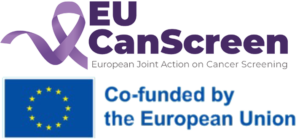Work Package 7:
Implementation research to improve the existing screening programmes
WP 7
Implementation

ICO, Spain
Work Package Summary
The overall objective is to provide tools and recommendations and reach consensus on essential processes to close the gap between current knowledge and practice in population-based cancer screening programmes (breast, colorectal, and cervical cancers), already provided as part of the standard services in most EU countries.
Specific objectives are as follows:
1) To identify the level of implementation of quality assurance (QA) management systems in EU cancer screening programmes and provide guidance for implementing PROMS as a quality indicator;
2) To establish and standardise key definitions for measurement and reporting of interval cancer rates;
3) To evaluate the impact of integrating AI solutions into the workflow for breast, colorectal, and cervical cancer screening on diagnostic accuracy, workflow efficiency, and patient outcomes;
4) To identify the most effective invitation strategies that incorporate modern information technologies applied in population-based cancer screening programmes and provide recommendations applicable in different settings;
5) To develop a framework to support the piloting and implementation of self-sampling in cervical cancer screening;
6) To identify high-quality online decision aids for cancer screening (breast, colorectal, and cervical cancer) with proven efficacy in real-world settings and develop a web-based decision aid mock-up to facilitate informed decision-making in CRC screening.
ICO, Spain
Tasks
| Task Nr | Task Name | Description | Participants |
| T7.1 | Implementing quality assurance (QA) scheme | 1.Situational analysis of quality management system implementation in EU population-based cancer screening programmes, which entails a stakeholder survey to identify EU population-based screening programmes, assessment of the extent of quality management system implementation, and determining number of countries with certification. 2. Identifying necessary resources for QA system implementation in established cancer screening programmes, which entails interviews with stakeholders involved in certified population-based screening programmes to delineate the required resources. 3. Identifying steps necessary for implementing PROMs in cancer screening programmes, which entails a systematic review to understand the nuances and challenges of integrating PROMS into cancer screening units, and a survey of EU MS that have successfully implemented them. We will also develop a robust and adaptable framework for their implementation across EU. This task will be led by UCY, Cyprus, co-led by ICO, Spain. | LU ICO, OIL, GÖG, CIPH, MoH SK, UCY, NIJZ, CPO, IU NAMSU, NCI, NOI, BCR |
| T7.2 | Classification and reporting of interval cancer rates | Summarizing current variations in measurement of interval cancers rate and the potential differences in screening programmes, we will agree on definitions, calculation methodology and benchmark for interval cancer rate. Further, we will pilot data collection; produce report detailing purpose, methodology including international comparison, and develop mechanism for ongoing data collection and benchmarking. This task will be led by HSE, Ireland, co-led by UCY, Cyprus | LU DoH IE, OIL, ICO, PHC, SCI, UCY, NCI, BCR, IU NAMSU, FHF |
| T7.3 | Integration of artificial intelligence in cancer screening programmes | 1. Through a series of online workshops involving some of the leading clinicians using AI in breast cancer screening practice and observing best practice, we will collect experiences and create a knowledge base on how AI influence the clinical practice. 2. Through user engagement, the knowledge base will be used to create guidelines and practical tools supporting easier validation and implementation of AI in breast cancer screening across Europe, created and tested as part of the training in WP11. 3. Based on the insights from the above tasks and work on the MAS-AI model in WP4 and WP10, a set of recommendations will be developed to address the effect and accuracy of AI solutions (a) for improved patient outcomes and support for decision makers regarding acquisition of commercial solutions and (b) for breast cancer screening and how they can be utilized in cervical and colorectal screening. This task will be led by RSYD, Denmark. | RSYD CSF, IACS, RUMC, RCC, OUS |
| T7.4 | Innovative approaches to invite target population in cancer screening programmes | 1. Overview of different invitation strategies and the use of modern information technology currently applied across EU and a review on the evidence of their effectiveness in improving participation to screening. We will draft a set of evidence-based recommendations on implementing invitation practices that consider differences in the organization of cancer screening. 2. Development of a framework for implementing self-sampling into cervical cancer screening programs for different settings. This includes a research protocol for piloting self-sampling that improves that can be used when conducting pilot studies. This task will be led by CSF (Finland). | LU ICO, OIL, ISPRO, PHC, NIHD CSF, LSMUKK, VULSK, AUSLRE, IU NAMSU, NNGYK |
| T7.5 | Implementing informed decision-making in population-based cancer screening programmes | Online decision aids (DA) for breast, colorectal and cervical cancer screening will be identified and their quality will be evaluated to DAs with the best scores. Previous web-based DAs methods will be identified and applied for development and testing, for instance, in terms of detail compatibilities, characteristics, technical issues, search term options, and factors to consider from the point of view of technicians. DA contents will be identification and developed. An initial version will be displayed in the web-based DA for CRC (FIT-based) screening. This task will be led by ICO, Spain. | LU ICO, GÖG IRFMN, DYPEDE |
| Task Nr | Task Name | Description | Participants | Role | In-kind Contributions/Subcontracting |
| T7.1 | Implementing quality assurance (QA) scheme | 1.Situational analysis of quality management system implementation in EU population-based cancer screening programmes, which entails a stakeholder survey to identify EU population-based screening programmes, assessment of the extent of quality management system implementation, and determining number of countries with certification. 2. Identifying necessary resources for QA system implementation in established cancer screening programmes, which entails interviews with stakeholders involved in certified population-based screening programmes to delineate the required resources. 3. Identifying steps necessary for implementing PROMs in cancer screening programmes, which entails a systematic review to understand the nuances and challenges of integrating PROMS into cancer screening units, and a survey of EU MS that have successfully implemented them. We will also develop a robust and adaptable framework for their implementation across EU. This task will be led by UCY, Cyprus, co-led by ICO, Spain. | LU ICO, OIL, GÖG, CIPH, MoH SK, UCY, NIJZ, CPO, IU NAMSU, NCI, NOI, BCR | COO BEN AE | No |
| T7.2 | Classification and reporting of interval cancer rates | Summarizing current variations in measurement of interval cancers rate and the potential differences in screening programmes, we will agree on definitions, calculation methodology and benchmark for interval cancer rate. Further, we will pilot data collection; produce report detailing purpose, methodology including international comparison, and develop mechanism for ongoing data collection and benchmarking. This task will be led by HSE, Ireland, co-led by UCY, Cyprus | LU DoH IE, OIL, ICO, PHC, SCI, UCY, NCI, BCR, IU NAMSU, FHF | COO BEN AE | No |
| T7.3 | Integration of artificial intelligence in cancer screening programmes | 1. Through a series of online workshops involving some of the leading clinicians using AI in breast cancer screening practice and observing best practice, we will collect experiences and create a knowledge base on how AI influence the clinical practice. 2. Through user engagement, the knowledge base will be used to create guidelines and practical tools supporting easier validation and implementation of AI in breast cancer screening across Europe, created and tested as part of the training in WP11. 3. Based on the insights from the above tasks and work on the MAS-AI model in WP4 and WP10, a set of recommendations will be developed to address the effect and accuracy of AI solutions (a) for improved patient outcomes and support for decision makers regarding acquisition of commercial solutions and (b) for breast cancer screening and how they can be utilized in cervical and colorectal screening. This task will be led by RSYD, Denmark. | RSYD CSF, IACS, RUMC, RCC, OUS | BEN AE | No |
| T7.4 | Innovative approaches to invite target population in cancer screening programmes | 1. Overview of different invitation strategies and the use of modern information technology currently applied across EU and a review on the evidence of their effectiveness in improving participation to screening. We will draft a set of evidence-based recommendations on implementing invitation practices that consider differences in the organization of cancer screening. 2. Development of a framework for implementing self-sampling into cervical cancer screening programs for different settings. This includes a research protocol for piloting self-sampling that improves that can be used when conducting pilot studies. This task will be led by CSF (Finland). | LU ICO, OIL, ISPRO, PHC, NIHD CSF, LSMUKK, VULSK, AUSLRE, IU NAMSU, NNGYK | COO BEN AE | No |
| T7.5 | Implementing informed decision-making in population-based cancer screening programmes | Online decision aids (DA) for breast, colorectal and cervical cancer screening will be identified and their quality will be evaluated to DAs with the best scores. Previous web-based DAs methods will be identified and applied for development and testing, for instance, in terms of detail compatibilities, characteristics, technical issues, search term options, and factors to consider from the point of view of technicians. DA contents will be identification and developed. An initial version will be displayed in the web-based DA for CRC (FIT-based) screening. This task will be led by ICO, Spain. | LU ICO, GÖG IRFMN, DYPEDE | COO BEN AE | No |
Subscribe to our newsletter to get news and updates.
Subscribe to our newsletter to get news and updates.

The general objective of EUCanScreen is to assure sustainable implementation of high-quality screening for breast, cervical and colorectal cancers, as well as implementation of the recently recommended screening programs – for lung, prostate and gastric cancers. EUCanScreen will facilitate the reduction of cancer burden and achieving equity across the EU.
This project has received funding from the European Union’s EU4HEALTH Programme under the Grant Agreement no 101162959











